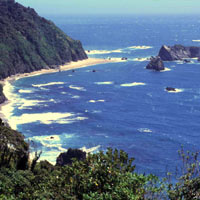Asia & the Pacific
New Zealand

- © UNESCO/ I.Forbes
- Ship Creek, Te Wahipounamu
New Zealand joined UNESCO on 04 November 1946. It is covered by the UNESCO office Apia, in Samoa.
The Hydrology for the Environment, Life and Policy (HELP) programme’s implementation in New Zealand reflects the successful collaboration between UNESCO and New Zealand. The programme’s activities were directed in the Mouteka Basin located near Nelson, on the northern most tip of the South Island.
The basin deals with intra-basin water conflicts referring to upstream-downstream issues, including the impact of forestry practices and water pollution affecting the shellfish industry in Tasman Bay.
Below you can access the projects that are currently being implemented in the country within the framework of UNESCO’s Natural Sciences Sector.
Freshwater
- Hydrology for the Environment, Life and Policy (HELP) projects:
- Asian Pacific Flow Regimes from the International Experimental and Network Data (Asian Pacific FRIEND)
- Hindu Kush HimalayanFlow Regimes from the International Experimental and Network Data (HKH FRIEND)
Oceans
- Pacific Tsunami Warning and Mitigation System (ICG/PTWS)
- Pacific Islands Global Ocean Observing System (PI-GOOS)
Earth Sciences
- Triassic Time and Trans-Panthalassan Correlations (IGCP, Project 467)
- Deltas in the Monsoon Asia-Pacific region (DeltaMAP, IGCP, Project 475)
- Quaternary Land-Ocean Interactions (IGCP, Project 495)
- Ordovician palaeogeography and palaeoclimate (IGCP, Project 503)
- Marine and Non-marine Jurassic: Global correlation and major geological events (IGCP, Project 506)
- Submarine Mass Movements and their Consequences (IGCP, Project 511)
- Karst Aquifers and Water Resources (IGCP, Project 513)
Sciences Policy and Sustainable Development
- Establishing Science and Technology Parks More
Coasts and Small Islands
- Youth Visioning for Island Living initiative: Traditional Treasures: Preserving and reviving the Niuean language More

